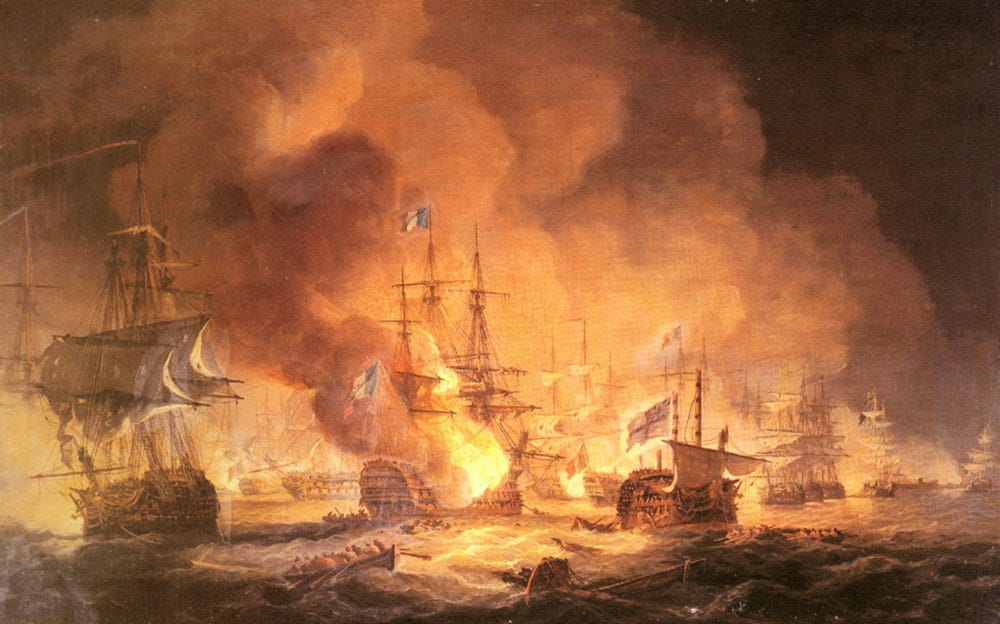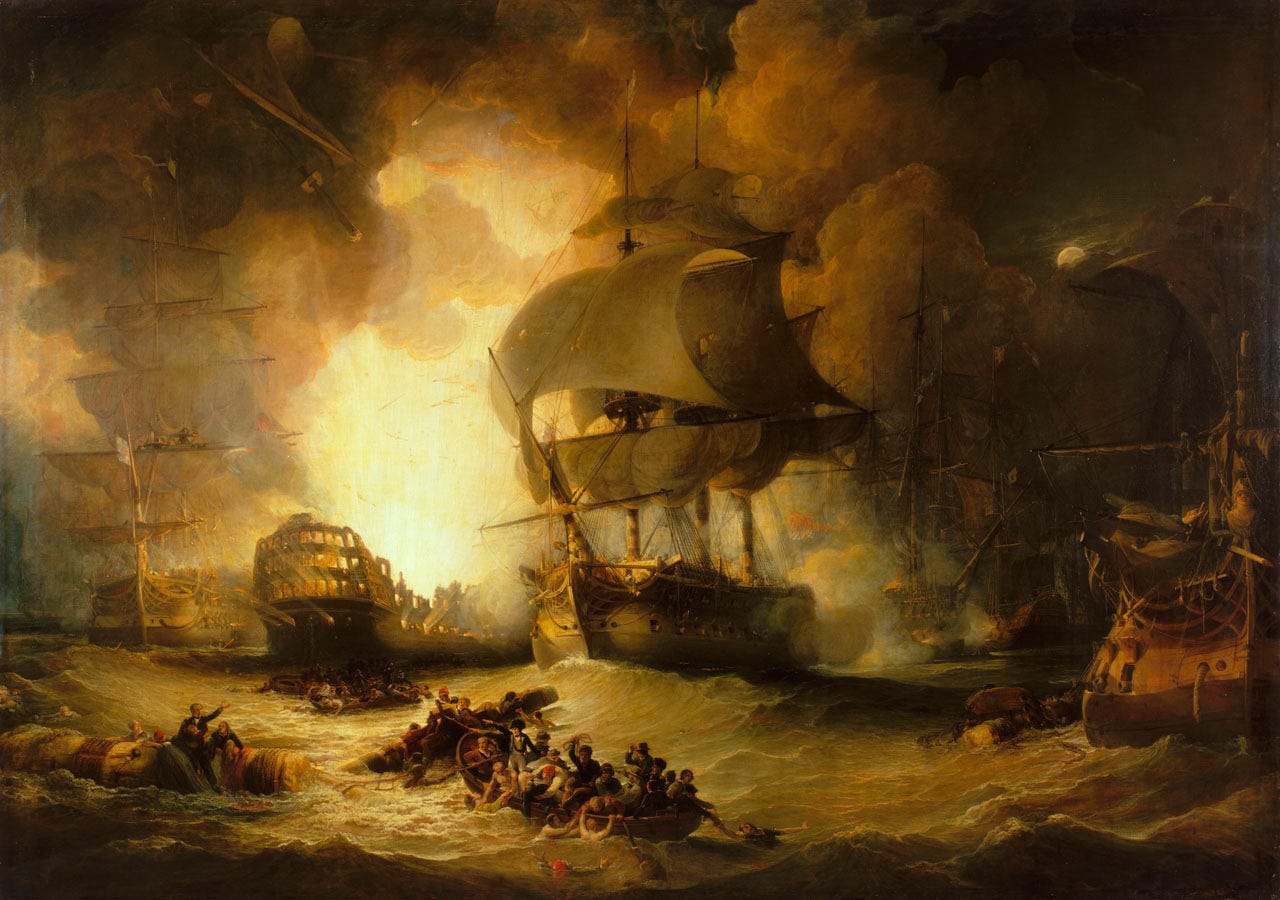Today in Middle Eastern history: the Battle of the Nile (1798)
An overwhelming British naval victory snuffs out Napoleon's dreams of an empire to rival Alexander's.
If you’re interested in history and foreign affairs, Foreign Exchanges is the newsletter for you! Sign up for free today for regular updates on international news and US foreign policy, delivered straight to your email inbox, or subscribe and unlock the full FX experience:
The “Battle of the Nile,” which didn’t really take place on the Nile but whatever, can be seen as the naval companion to the Battle of the Pyramids, which was fought 11 days earlier between French and Egyptian forces outside of Cairo and which, coincidentally, didn’t take place near any pyramids. It can also be treated as the previous battle’s bookend. As successfully as the Battle of the Pyramids began Napoleon’s campaign in the Middle East, the Battle of the Nile all but ensured that it would end in failure.
You may recall from our discussion of the Battle of the Pyramids that, after coming ashore at Alexandria, Napoleon ordered his fleet to sail east and anchor in Abu Qir Bay (sometimes written as Abukir or Aboukir), near the Nile Delta. A British fleet, under the command of an obscure admiral named Horatio Nelson, was at that time sailing around the Mediterranean, having a few months prior received word that France was putting together a large fleet (Napoleon sailed hundreds of ships to Egypt, and it was impossible for the preparations for that sort of excursion to go unnoticed). His initial small squadron was reinforced from Britain until it numbered some 14 ships of the line, roughly the same size as Napoleon’s fleet if you ignore the hundreds of French troop transports that would have been of little use in a naval fight.
It was Nelson who figured out, based on reported sightings of the French fleet, that Napoleon was headed to Egypt. But he kind of botched his chance to strike what could have been a history-changing blow. Believing that Napoleon had a several days’ head start, Nelson sailed full speed to Alexandria from Naples on June 22. In fact the British fleet unknowingly passed the French that very evening, and arrived at Alexandria well ahead of them. Nelson had significantly overestimated how much farther ahead Napoleon was, and therefore missed the opportunity to attack said fleet at sea and maybe preempt the entire Egyptian invasion. You could argue, even, that he missed a prime chance to kill Napoleon before the whole…well, I assume you know how that all played out.
On the other hand, maybe things worked out for the best from Nelson’s perspective. His plan, had he caught up to the French, called for sending part of his fleet to chase the French troop transports, leaving the rest of his ships to be outnumbered by the French ships of the line. Obviously we’ll never know, but this was probably a very bad plan. In other words, it’s quite possible that had Nelson actually caught up with the French at sea he would’ve lost the ensuing battle.
Casting around to figure out what had happened—and at this point having no idea where Napoleon was—Nelson sailed his fleet first north to Anatolia and then west toward Sicily. Napoleon, meanwhile, arrived at Alexandria at the end of June. While Nelson didn’t know where Napoleon was, Napoleon definitely knew that a British fleet was sniffing about the eastern Mediterranean, and so he ordered a hasty (and uncharacteristically sloppy) disembarkation and then, after determining that Alexandria’s harbor was too shallow and too exposed, had the fleet sail to Abu Qir. He issued further orders that, if Abu Qir didn’t offer enough protection, the fleet’s ships of the line were to sail north to Corfu. But Napoleon’s admiral, François-Paul Brueys d’Aigalliers, was determined to keep the fleet nearby to support Napoleon’s invasion. It seems that Napoleon later ordered the fleet to Corfu to engage in operations against the Ottoman navy, but those orders never reached Brueys. So Abu Qir it was.
Brueys arranged his ships of the line in an actual defensive line—with each ship captain ordered to chain his vessel to the ones fore and aft—that stretched almost 3 kilometers and was anchored at the center by his flagship, the massive 118 gun Orient. The line was bookended by an island at one end and shallow shoals to the other that he figured the British fleet would struggle to navigate. The latter Brueys defended by turning some of his transports into makeshift gun ships and bomb ships, as well as by garrisoning a fort on a small rocky island in the shallow water.
Brueys screwed up in several ways. He left too wide a gap between the end of his line and the shoals, so it was possible for British ships to sail in behind the French fleet. Then, assuming that it would be impossible for the British to get around his line, he didn’t bother loading or preparing the cannon on the rear (port) side of his ships, so that if Nelson could get ships around the French line the French would be unable to fire upon them. Third, Brueys left too much space between his ships, enough space to allow British vessels to sail between them. Of course this would have been impossible had all of his captains followed the orders to chain their ships together, but several of them did not. The French fleet was also struggling to find enough food and water, Napoleon having taken most of its provisions with him on his march to Cairo. The need to send out foragers left the fleet undermanned when the time came to fight.
Nelson was still somewhat frantically sailing around the eastern Mediterranean trying to catch a break when, while at the Greek port of Koroni in late July, he finally got word of the Egyptian invasion. He made a beeline south, found nothing at Alexandria, and then began canvassing the Egyptian coast to the east. The British fleet arrived at Abu Qir sometime on the afternoon of August 1. While conventional wisdom would have argued for attacking the following morning, Nelson decided to strike right away. Brueys probably assumed that Nelson would wait and may have been planning to try to slip out of the bay and make a break for it under cover of darkness. At the very least, Nelson had to consider the possibility that the French would attempt to run, so if he wanted to force a battle then attacking immediately was the best way to do it.
Nelson opted to focus his attack on the end of the French line near the shoals, and as you’ve probably already guessed several of his captains figured out that it was possible to sail around that end of French line and attack from the French fleet’s unprotected rear. One by one the French ships at that end of the line were knocked out of the battle, badly damaged and having taken many casualties. Nelson himself was wounded but got stitched up and returned to command the latter part of the battle on his flagship, the Vanguard. Brueys was not so lucky. Although the Orient more than held its own for the first part of the battle due to its size and firepower, Brueys himself was killed by British cannon fire. Then sometime before 9 PM (when it was noticed by British sailors) a fire broke out on the Orient’s lower deck. Several British vessels focused their guns on that fire and helped it spread uncontrollably throughout the ship. At around 10 PM it hit the Orient’s magazine and the vessel exploded.

The battle was over at that point, but skirmishes continued between the remaining French ships and the British fleet. Two French ships of the line and two frigates were able to break out of the bay and escape, but the rest–11 ships of the line and two frigates in total–were either destroyed or captured, with the final two surrendering on August 3. Britain lost a little over 200 sailors against as many as 5000 French killed and over 3000 more taken prisoner.

The British victory at Abu Qir had ramifications beyond Egypt. It was so total, and the French losses so comprehensive, that France was unable to challenge British naval superiority in the Mediterranean again for the rest of the Napoleonic period. France very quickly lost control of Malta, which Napoleon had conquered on his way to Egypt. Napoleon’s plans to force an alliance on the Ottomans after he’d seized Egypt went up in smoke when the Ottomans, emboldened by the British victory, declared war on him instead. Nelson’s reputation, which was battered as he scrambled around the Mediterranean looking for Napleon, was salvaged and enhanced. He remained a consistent thorn in Napoleon’s side until he was killed in 1805 while in the process of winning the Battle of Trafalgar—an engagement much more famous, but arguably no more consequential, than this one.
But of course the immediate effect of the Battle of the Nile on Napoleon’s Egyptian expedition was profound. Instead of a French fleet shadowing and supporting his advance up the eastern Mediterranean coast, Napoleon had to deal with the British fleet harassing him every step of the way. His hope—that France might outfit another fleet and attempt to break through the British fleet to come to his aid—never materialized. His contingency plan—it seems clear from the way he’d outfitted his army that he’d intended for it to operate independently of the mother country if push came to shove—proved inadequate. Britain’s involvement was decisive in Napoleon’s defeat at Acre in May 1799, which was the point at which the French general gave up his dreams of imperial conquest and began planning his return to France, having in the end never really conquered much more than Cairo.
To Napoleon’s credit, I suppose, he did smack around the Ottomans before departing. And to be fair, things worked out pretty well for Napoleon back in France, for a few years anyway, and many of the officers he’d brought with him to Egypt went on to serve quite ably in his European campaigns. Things certainly could have gone much worse for him had Nelson found him at sea before he made it to Egypt. But his dreams—of a new French Empire to rival Britain’s and a new Napoleonic Empire to rival Alexander’s—both died very prematurely at Abu Qir.

